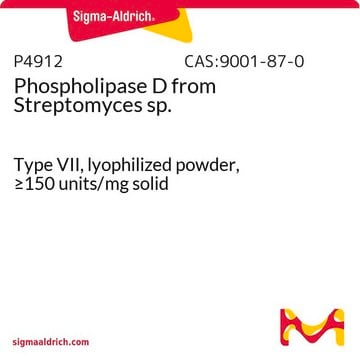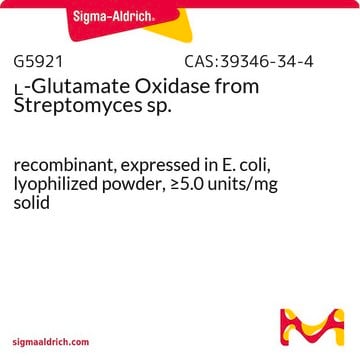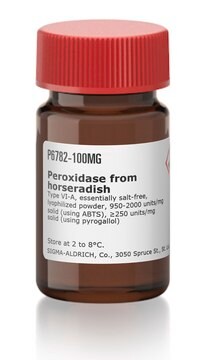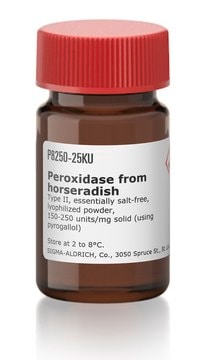C4405
Choline Oxidase from Arthrobacter globiformis
lyophilized powder, 8-20 units/mg solid
Synonym(s):
Choline: oxygen 1-oxidoreductase
Sign Into View Organizational & Contract Pricing
All Photos(2)
About This Item
Recommended Products
form
lyophilized powder
Quality Level
specific activity
8-20 units/mg solid
mol wt
71 kDa by SDS-PAGE
83 kDa by gel filtration
storage temp.
−20°C
General description
Research area: Cell signaling. Choline oxidaseis a flavoprotein and belongs to the glucose methanol choline(GMC)-oxidoreductase family.
Application
Choline Oxidase from Arthrobacter globiformis has been used:
- for enzymatic determination of choline (Cho) and phosphocholine (P-Cho)
- in sphingomyelin assay to determine the concentration of sphingomyelin by measuring free choline
- in enzyme coating for the fully-assembled recording device for electrochemical measurements
Choline oxidase from Sigma has been used in the enzymatic determination of choline in milk using a flow injection analysis (FIA) system with potentiometric detection.Choline oxidase from Arthrobacterglobiformis is suitable for the preparation of amperometric biosensors.
Biochem/physiol Actions
Choline oxidase catalyzes the four-electron oxidation of choline to glycine-betaine, with betaine-aldehyde as intermediate and molecular oxygen as primary electron acceptor. The enzyme can also accept betaine-aldehyde as a substrate. This allows the investigation of the reaction mechanism for the conversion of choline to the aldehyde intermediate and of betaine-aldehyde to glycine-betaine. The enzyme is a flavoprotein with a molecular weight of approximately 83,000 Da according to gel filtration or approximately 71,000 Da according to SDS gel electrophoresis. The optimum pH is found to be around pH 7.5 and the isoelectric point (pI) around pH 4.5.
Unit Definition
One unit will form 1 μmole of H2O2 with oxidation of 1 μmole of choline to betaine aldehyde per min at pH 8.0 at 37 °C. Note: During the conversion of choline to betaine by choline oxidase, 2 μmoles of H2O2 are produced for every μmole of choline.
related product
Product No.
Description
Pricing
Signal Word
Danger
Hazard Statements
Precautionary Statements
Hazard Classifications
Resp. Sens. 1
Storage Class Code
11 - Combustible Solids
WGK
WGK 3
Flash Point(F)
Not applicable
Flash Point(C)
Not applicable
Personal Protective Equipment
dust mask type N95 (US), Eyeshields, Gloves
Certificates of Analysis (COA)
Search for Certificates of Analysis (COA) by entering the products Lot/Batch Number. Lot and Batch Numbers can be found on a product’s label following the words ‘Lot’ or ‘Batch’.
Already Own This Product?
Find documentation for the products that you have recently purchased in the Document Library.
Customers Also Viewed
Choline import into chloroplasts limits glycine betaine synthesis in tobacco: analysis of plants engineered with a chloroplastic or a cytosolic pathway
Nuccio ML, et al.
Metabolic engineering, 2(4), 300-311 (2000)
A multi-site array for combined local electrochemistry and electrophysiology in the non-human primate brain
Disney AA, et al.
Journal of Neuroscience Methods, 255, 29-37 (2015)
Rungaroon Waditee et al.
The Journal of biological chemistry, 278(7), 4932-4942 (2002-12-06)
Glycine betaine (N,N,N-trimethylglycine) is an important osmoprotectant and is synthesized in response to abiotic stresses. Although almost all known biosynthetic pathways of betaine are two-step oxidation of choline, here we isolated two N-methyltransferase genes from a halotolerant cyanobacterium Aphanothece halophytica.
Shufen Li et al.
Plant, cell & environment, 34(11), 1931-1943 (2011-06-30)
Tomato (Lycopersicon esculentum cv. 'Moneymaker') was transformed with a codA gene, from Arthrobacter globiformis, for choline oxidase that had been modified to allow targeting to both chloroplasts and the cytosol. Glycinebetaine (GB) accumulated in seeds of transformed plants up to
J L Lima et al.
The Analyst, 125(7), 1281-1284 (2000-09-14)
The development of a FIA system for the determination of total choline content in several types of milk is described. The samples were submitted to hydrochloric acid digestion before injection into the system and passed through an enzymatic reactor containing
Our team of scientists has experience in all areas of research including Life Science, Material Science, Chemical Synthesis, Chromatography, Analytical and many others.
Contact Technical Service















